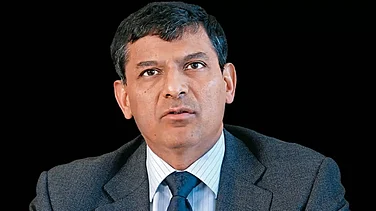There was a big difference between May 18 and July 6--2,980 points on the BSE Sensex to be precise. On May 18, the day the election results came in, the Sensex shot up by 2,110 points. But on budget day, it slumped by 870 points. Says Motilal Oswal, Chairman and Managing Director, Motilal Oswal Financial Services,"Investors voted positively for the Congress-led government but they have voted negatively for thebudget." So what sent the markets tumbling??
"These are the consequences of a huge fiscal deficit and a perception that this is a status quo budget that lacksvision," says Dilip Bhat, Joint Managing Director, Prabhudas Lilladher--a Mumbai-based securities firm."A higher than expected fiscal deficit also impacts investment cycle recovery," says Vikram Kotak, Chief Investment Officer, Birla Sun Life Insurance Company. He believes that the market was disappointed as Foreign Direct Investment ceilings on a few sectors were left untouched. That, along with no significant mention on divestments, also made short-term participants jittery. However, foreign institutional investors (FIIs) pumped in Rs 568 crore on the market drop on budget day.?
The budget did have some positives though. The New Pension System which is aimed at providing a much needed social security system was one. The income of the trust, which operates the pension system, has been exempted from income tax. Also, the dividend paid to the trust will not attract Dividend Distribution tax. Further, the purchase and sale of equity shares by the trust will be exempted from the Securities Transaction tax.?
All of this could give the new pension funds a cost edge compared to taxing saving schemes of mutual funds. Moreover, the new pension system is attractive because it has more freedom to invest in the markets when compared to other small saving investment options.?
The Commodity Transaction Tax, introduced in The Finance Act, 2008, is proposed to be abolished."The uncertainty of commodity market viability with respect to the cost of transaction has beenremoved," says Anjani Sinha, Director, Multi Commodities Exchange. "The tax entails a rise of total transaction cost from Rs 2.00 per lakh to Rs 19.25 per lakh,a€?" say Pravakar Sahoo and Rajiv Kumar in a working paper on"impact of commodity transaction tax on futures trading in India"a€? released by Indian Council for Research on International Economic Relations in July 2008."The announcement will put the Indian commodity market ecosystem at par with internationalexchanges," says the Multi Commodity Exchange's Sinha.?
A broker, on condition of anonymity, says that the markets began to slide as soon as it became evident that there won't be any tax cuts for the corporate sector."It was more of expectations not being met," says the broker. "The markets are now correcting, in line with the operatingfundamentals," says Saurabh Nanavati, Chief Executive Officer, Religare Mutual Fund. The hype prior to the budget has turned out to be unjustified. Don't blame the finance minister for that.
Why The Markets Tanked
The hype prior to the budget turned out to be unjustified. Why blame the finance minister for that. High expectations were as much to blame as anything else
Updated on:

Why The Markets Tanked
Why The Markets Tanked
Tags

























